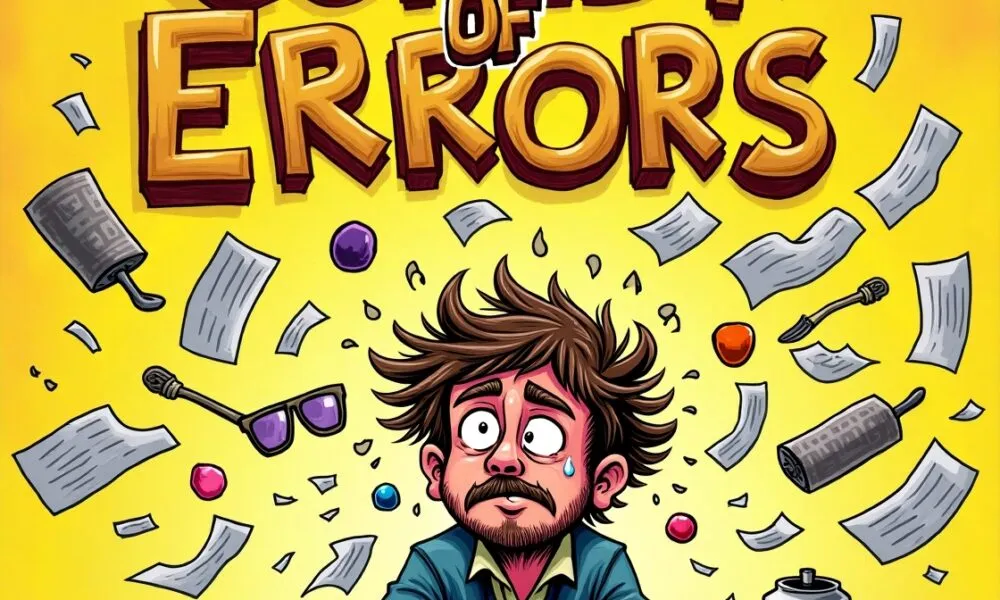“The Comedy of Errors” is one of William Shakespeare’s most entertaining and light-hearted plays.
Filled with confusion, chaos, and laughter, it remains a favorite among audiences and readers alike.
Let’s dive into this comedic masterpiece to understand why it continues to bring joy even centuries after it was first performed.
The Plot in a Nutshell
At its core, “The Comedy of Errors” is a story about mistaken identities and the hilarious mix-ups they create.
The play follows two sets of identical twins who were separated at birth: Antipholus of Syracuse and Antipholus of Ephesus, along with their respective servants, Dromio of Syracuse and Dromio of Ephesus.
When Antipholus of Syracuse arrives in Ephesus, the city where his long-lost twin resides, a whirlwind of confusion ensues.
People mistake one twin for the other, leading to misunderstandings, wrongful accusations, and comical confrontations.
Themes That Resonate
Mistaken Identity:
The play’s central theme is the confusion caused by identical appearances.
This premise sets the stage for endless hilarity as characters grapple with situations that defy logic.
Family and Reunion:
Beneath the comedy lies a heartfelt story about family and the joy of reunion.
By the end of the play, the separated twins and their parents are joyfully reunited, adding emotional depth to the humor.
Chaos and Resolution:
The structured chaos in the play keeps audiences entertained, while the resolution brings satisfaction and closure.
Daisy Jones & The Six: A Rock “n” Roll Saga of Love, Music and Chaos
Memorable Moments
One of the most amusing aspects of “The Comedy of Errors” is the interaction between the twin servants, the two Dromios.
Their witty banter and slapstick humor add layers of comedy to the already absurd situations.
For instance, the mix-ups lead to Dromio of Syracuse being sent on errands he doesn’t understand, and Dromio of Ephesus being chastised for things he didn’t do.
These moments create laugh-out-loud scenarios that audiences can’t get enough of.
Why It’s Timeless
“The Comedy of Errors” remains relevant because it taps into universal themes of human folly and connection.
Who hasn’t experienced misunderstandings or found themselves in a situation that felt like a comedy of errors?
The play’s humor, combined with Shakespeare’s brilliant wordplay, ensures that it transcends time and culture.
Conclusion
If you’re looking for a lighthearted introduction to Shakespeare or simply a story that guarantees a good laugh, “The Comedy of Errors” is the perfect choice.
Its blend of slapstick comedy, clever dialogue, and touching moments of reunion makes it a masterpiece that continues to delight audiences around the world.
Frequently Asked Questions
1. What is the concept of comedy of errors?
The concept of a comedy of errors refers to a humorous narrative, typically a play, centered on a series of misunderstandings, mistaken identities, and absurd situations.
These blunders and mix-ups often lead to confusion and chaos, but eventually resolve in a lighthearted or happy ending.
2. What is a comedy of errors slang?
In slang, a comedy of errors refers to a chaotic situation filled with mistakes, miscommunications, or mishaps that are unintentionally funny or ridiculous.
3. Who wrote A comedy of Errors?
A Comedy of Errors was written by William Shakespeare.
It is one of his early plays and is believed to have been written in 1594 or earlier.
The play is a farcical comedy that revolves around mistaken identities involving two sets of identical twins.
4. How many lines are in comedy of Errors?
William Shakespeare’s The Comedy of Errors consists of 1,787 lines.
It is one of his shortest plays.
5. What is the genre of the comedy of errors?
It is one of William Shakespeare’s most humorous plays, characterized by exaggerated situations, mistaken identities, slapstick humor, and improbable coincidences.
The play is often classified as a comedy of intrigue and a romantic comedy, showcasing Shakespeare’s early exploration of humor through misunderstandings and the eventual resolution of chaotic circumstances.
6. Who is the hero of comedy of errors?
The hero of The Comedy of Errors is Antipholus of Syracuse, whose search for his twin brother drives the play’s events.

